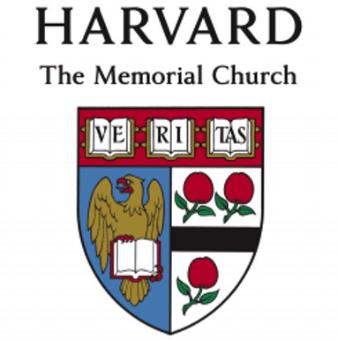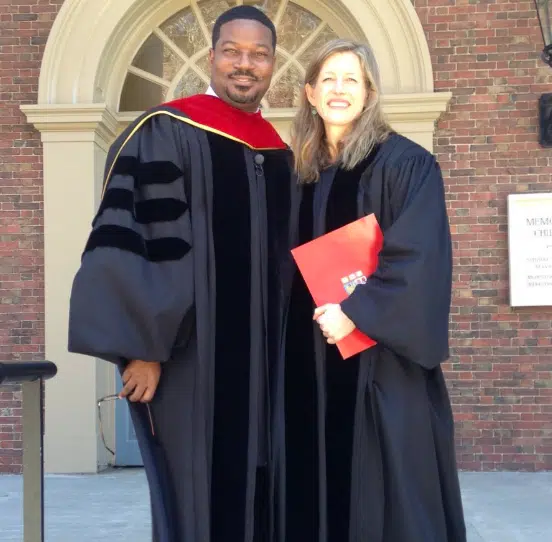
CEE Director Karenna Gore Delivers Earth Day Sermon at Harvard Memorial Church
CEE Director Karenna Gore celebrated Earth Day by offering a sermon at Harvard Memorial Church. She was introduced by Harvard Professor Jonathon L. Walton.
Listen to the audio here
Full text of Karenna’s Earth Day sermon April 22, 2018:
The Wisdom of the Earth
Thank you friends; thank you Reverend Walton.
Thank you all for inviting me back to my alma mater this morning. “Alma
Mater” means “nurturing mother” which is the way that many of the
world’s religious and spiritual traditions refer to the Earth.
On this Earth Day, I would like to offer a reflection on the Wisdom of the
Earth, starting with the words of Howard Thurman, the longtime dean of
Marsh Chapel at Boston University. He recalled the feeling he had as a
child on the Atlantic coast of Florida: “I had the sense that all things, the
sand, the sea, the stars, the night, and I were one lung through which all life
breathed. Not only was I aware of the vast rhythm enveloping all, but I was
a part of it and it was a part of me” . . . He goes on to say “the resulting
synthesis was to me religious rather than metaphysical.”
We are created of the Earth, of course. The water in our bodies, the iron in
our blood, the calcium in our bones, the air in our lungs, the soil and
sunshine in the food that sustains us. The thoughts in our minds and the
feelings in our hearts are also elemental—they are connected to what it is
we choose to perceive and ponder. In this time of information revolution–
and revolting information— how do we find wisdom?
In the book of Proverbs, “Wisdom” is not merely an abstraction. In
Chapter 3, verse 18, “She is a tree of life to all those who lay hold of her
and those who hold her fast are called happy.” In Proverbs 8, she speaks:
“When he established the heavens, I was there.” “And now, my children,
listen to me: happy are those who keep my ways.”
In the Book of Luke, there is a striking quotation from Jesus. He is speaking to a crowd of people. “You hypocrites! You know how to interpret the appearance of earth and sky, but why do you not know how to interpret the present time? And why do you not judge for yourselves what is right?” (Luke 12:56-57)
Today we as a people look down to our handheld devices more than up at the sky at all. We may not even know how to read the weather itself anymore, much less the deeper truths of our time.
But the signs abound. Stronger storms and floods, heat waves, droughts,
wildfires. For the third year in a row, in the middle of winter, temperatures
at the North Pole climbed above freezing for significant time periods. The
ice in the Arctic, including the massive ice cap on top of Greenland, has
begun to melt faster and faster, even as many Antarctic glaciers are moving
towards the sea more quickly. So sea levels are rising fast, and climate
refugees have begun to stream from small island nations and low lying
coastal areas.
And it is not just humans that are migrating. Both animals and plants are
moving towards the poles at an average rate of 15 ft per day. Some are
climbing slopes in search of cooler air. Many species face extinction, not
only because of the changing climate but also because their habitats are
being devoured by human societies.
We could also interpret the proliferation of plastic waste as a sign, one that
is more visible than the gaseous heat-trapping waste we are constantly
spewing into the thin shell of atmosphere—the sky. And yet, political
leaders still call for more drilling, fracking and burning of fossil fuels, as if
there is nothing wrong. The signs are clear: something is very wrong
indeed. As Pope Francis famously said “if we destroy Creation, Creation
will destroy us.”
This reminds me of a joke: What’s the difference between an optimist and a pessimist? The pessimist says I just can’t imagine how things could get much worse and the optimist says “oh I think I can!”
Perhaps this moment in time is not best understood as a choice between optimism and pessimism, but rather as a call to wisdom.
In the book Braiding Sweetgrass: Indigenous Wisdom, Scientific Knowledge and the Teachings of Plants, Robin Kimmerer writes, “Restoring land without restoring our relationship is an empty exercise. It is relationship that will endure and relationship that will sustain the restored land. Therefore connecting people and the landscape is as essential as reestablishing proper hydrology or cleaning up contaminants. It is medicine for the earth.” It is also medicine for humanity.
Like the crowd Jesus spoke to, we as a whole are paying attention to the
values of a system that we know to be untethered to the truth of who we
really are. The gospel of our time is economic growth and the way we
measure it encourages what is known as “the externalization of costs”—
pollution, exploitation, breakdown of communities, the depletion of
groundwater, forests, wetlands, and the web of biodiversity. The term
“externalities” comes from the language of economists. What it means is, it
is ok to ignore it. In our political sphere, this is held in place in the name of
prosperity and freedom. We forget that the source of all wealth and life is
the biosphere itself. As the Bengali poet Rabindranath Tagore wrote
“Emancipation from the bondage of the soil is no freedom for the tree.”
One reason we are stuck in this perverse trajectory, trapped in a society
that is designed to be at war with the natural cycles of life, is because of
bad theology. The papal bulls from the Vatican in the 15 th century invoked
the Book of Genesis when they asserted that that the Bible gave European
explorers the right to “conquer, vanquish and subdue” the peoples of
Africa and the Americas. They labeled them “part of the flora and fauna”
of the land to be claimed by Christendom. [This led to the Doctrine of
Discovery, still cited in American jurisprudence.]
And for millennia many leaders have claimed Biblical authority for male to
dominate female. Eco-womanist theologian Melanie Harris points out that
“the powerful connections that can be observed between human life-givers
(mothers/creators) and creation as Mother Earth” are still “often deemed
heretical, pagan, and sacrilegious.” (245). So when the politicians working
remove protections against pollution and to open our public lands and
oceans to fracking and drilling eagerly pronounce themselves “good
stewards of the Earth,” when the catch phrase of the day is “Energy
Dominance,” they are operating within a theological tradition we know all
too well.
Domination does not mean that the real power of the dominated
disappears. As Jesus said, in the beginning of Luke 12, “Nothing is covered
up that will not be uncovered and nothing is secret that will not become
known.” The humanity that was denied by the version of Christianity that
justified oppression of Native peoples and slavery is powerfully before us.
Black Lives Matter. And whether you believe in it as an expression of the
divine feminine or not, the Earth is speaking, with Wisdom, saying . . . Me
Too.
The people suffering most from extraction economy are those who are also
dealing with racism and marginalization. Who can forget one of the most
stunning signs of our times, just a few years ago in Standing Rock. The
Standing Rock Sioux opposed an oil pipeline through their sacred land that
threatened the underground aquifer of water they had drawn from for time
immemorial. They established a peaceful prayer camp with allies from all
over the world and they spoke their truth: “we are protectors not
protestors” and “water is life.” They spoke of Mother Earth with
reverence. They stood unarmed in the land of their ancestors- in front of a
wall of militarized police who were there protecting the rights of a private
corporation. This pipeline was built. More such pipelines are being built.
They are financed by investors and banks who seek monetary profits.
Why do we not judge for ourselves what is right?
This University is in a time of judging for itself about its financial
relationship to the fossil fuel industry and I join with those who are saying:
it is time to divest.
Proverbs 3:14 teaches that the “income [of Wisdom] is better than silver
and her revenue is better than gold.”
Jesus said, “You hypocrites!” Perhaps some of us are afraid to judge what
is right because we fear the specter of our own hypocrisy. We feel so
implicated in the systems that we know are causing ecological harm (as
consumers if nothing else) that we are afraid to judge for ourselves what is
right, lest the judgment of others rain down upon us. And so by default we
choose an even greater hypocrisy — silent complicity in the absurd
assumption that nothing is wrong.
Even among the hypocrisies and absurdities of our time, there is a
powerful common human desire for community and connection. In
Laudato Si, Pope Frances writes that “An authentic humanity, calling for a
new synthesis, seems to dwell in the midst of our technological culture,
almost unnoticed, like a mist seeping gently beneath a closed door” (§112).
Of course, there is also hope from the new capacity for generating and
storing energy from the sun and wind. A recent headline from the Onion
reads, “Scientists Politely Remind World That Clean Energy Technology
Ready To Go . . . Whenever.” But it is authentic humanity that will truly
heal and relationship that will sustain and endure.
The Earth, all of our alma mater, is ending the illusion of separation. There
are no externalities. We must respect this living planet and live within her
bounds. The non-canonical Gospel of Thomas says: “If you bring forth
what is within you, what you bring forth will save you. If you do not bring
forth what is within you, what you do not bring forth will destroy you.”
The wisdom of the Earth is within us. In our present time, with all its signs
and wonders, let us bring it forth.
***

